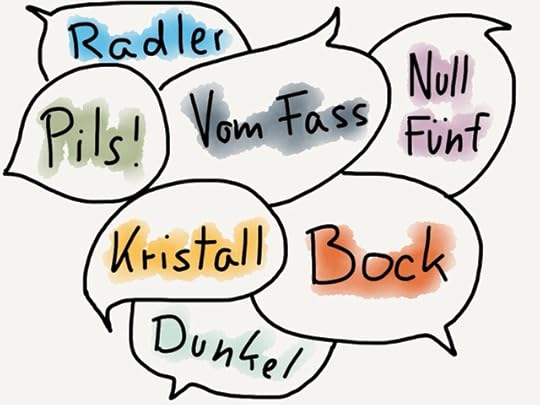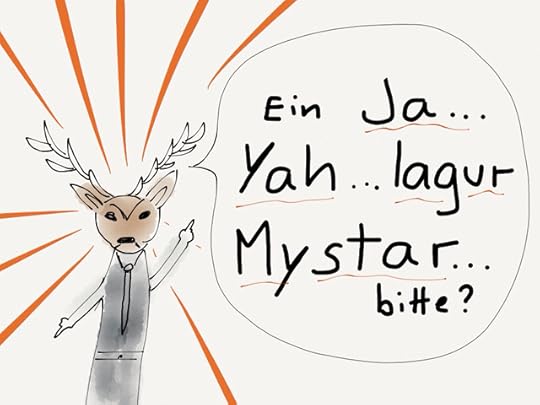André Klein's Blog, page 23
March 4, 2013
Language Learning Is Not A Contest

Browsing through language learning related forums and blogs, I sometimes get the impression that language learning is a new sport. Learners boast with the number of tongues they have “mastered” and conversation topics circle around questions of “Faster, Higher, Stronger” with the polyglots as both heroes and judges of the fledgling adepts.
And while anything humans do can and will be turned into a competitive sport – from cheese rolling through extreme ironing, wife carrying or worm charming – let’s leave the medals and winner’s podium aside for a while.
You Are What You Speak
Of all the things a person can learn in this world, language is one of the most mind-boggling. It’s deeply personal, shaped by individual preferences and dispositions and ultimately indistinguishable from the human being who speaks it.
If we compare a basic arithmetic skill such as multiplication to a basic language skill like translation we see that when two or more people (correctly) multiply 7 by 7 they always reach the same result, whereas two or more translators might translate one and the same sentence in a myriad different ways.
One of the main principles of scientific method is reproducibility – the idea that the same results can be achieved “in different locations by different people”. In that sense, language is not an “exact science”, or is it?
For now, let’s just say that language is an integral part of an individual’s personality. Language is how we make sense of the world and communicate our experience to ourselves and others. Since each person in the world sees and understands the world differently, we all express ourselves in our own very unique ways – even if we all speak the same language we still make different choices in terms of vocabulary, grammar and style.
The Rat Race Of Foreign Language Acquisition
When it comes to foreign language learning, courses and textbooks often like to give the impression that acquiring a foreign tongue is a clear-cut process with certain quantifiable goals and results. If we take a look at the Common European Framework of Reference for Languages, for example, there are neatly separated levels and sublevels designed to pinpoint particular stages of foreign language learners. Usually these stages are described in terms of abilities, i.e. “can understand and use familiar everyday expressions”, “can introduce him/herself”, etc.
While these stages may be helpful in order to group learners adequately for beginner’s courses and create a variety of different “standardized tests” with accompanying diplomas, they don’t hold much water beyond this mere functionality.
During the many years I spent teaching German as a foreign language, I noticed that particularly grown-up students seemed to be obsessed with being classified and knowing their place on the scale. There is of course the understandable issue of needing to reach a certain level in order to be handed a visa, work permit, etc. but on a deeper layer these levels also tended to breed competition between learners.
When the ability to express oneself and communicate with other people takes the backseat to achieving arbitrary levels and proficiency classifications, we’re not in the business of learning languages, we’re trying to beat the game of language.
Taking The Edge Off
In the end, it’s only natural that we compare ourselves with others while learning a language. We wonder why some people seem to make more progress and others get left behind. We don’t want to be that person who still can’t put one meaningful sentence together after studying a language for two years. Language is deeply personal. We don’t want to be ridiculed for our accents or feel insecure in grammar and spelling. But we tend to forget sometimes that each person learns very differently. Some get really good at speaking while others excel in reading comprehension or writing.
Learning a new language entails a lot of pressure, both socially and psychologically. In my experience as a teacher and learner, creating more pressure through baseless comparisons is not just a waste of time but can make our progress even more difficult.
Maybe we just might allow ourselves to develop a language naturally, at our own pace, knowing that just as our personal learning process is unique, so will be our abilities in the new tongue. If other people have advice for us, we can listen or even study together for a while but in the end their journey is a different one than ours. The yardstick is in our own hands.
-
img: CC by mylocationscouts
Use Your Kindle To Learn A Foreign Language
5 False Prophets In Language Teaching
Will it Blend? Putting the Person Back in Personalized Online Learning Studies
4 Tips To Learn The Language of Love
What Makes Studying So Difficult?
Zemanta

 About the author:
André Klein was born in Germany, has grown up and lived in many different places including Thailand, Sweden and Israel. He has produced two music albums, performed and organized literary readings, curated an experimental television program and is the author of various short stories and non-fiction works.
About the author:
André Klein was born in Germany, has grown up and lived in many different places including Thailand, Sweden and Israel. He has produced two music albums, performed and organized literary readings, curated an experimental television program and is the author of various short stories and non-fiction works.
February 27, 2013
Code or Die: The Future Of Work?

In a new video designed to spread awareness about the importance of teaching people how to code, big promises are being made. Backed up by talking heads such as Zuckerberg, Gates and many more, the basic premise is that coding is the core asset for tomorrow’s job market. “Want to enjoy the colorful offices and prestige of working for a company like Google or Facebook? Then get off your rear-end and sign up for a programming course.”
1. Coding Is Not Magic (Not Really)
“The programmers of tomorrow are the wizards of the future. You’re going to look like you have magic powers compared to everybody else.“ – Gabe Newell, Founder and President, Valve
Everyone loves to play little games on their iPhone, chat with their friends or watch funny YouTube videos. We usually don’t think much about the code behind these applications, we just use them. We’re happy if we manage to keep up with Facebook’s frequent changes and remember all our passwords for various sites and services.
Do we experience software as magic? Usually not. But when we see a person who is able to scroll through pages of numbers and strange symbols and transform this chaos into beautiful apps and games, it does seem a bit magical to most of us, doesn’t it?
The third law of Clarke says that “any sufficiently advanced technology is indistinguishable from magic”. Does that mean that our own technology is too advanced for us? Why is there such a huge gap between users and programmers? Do we really need to know how a software works in order to appreciate it?
While these questions are all up for discussion, there’s one thing that’s for sure: learning to code is not a magic pill to get into Silicon Valley.
2. It Takes Much More Than That
In a brilliant critique of the campaign, Kirsten Winkler urged us to take a look at the people in the video.
“They are not just code monkeys, they have other interests and skills they are able to use in their free time. Like the band that jams in the office. People who get the high paid jobs have many more skills than typing “if then else” phrases. They are foremost creative and can solve problems on their own.”
One could define coding as a way of looking at problems and finding creative solutions. In that sense, learning to code might help you solve problems in everyday life, but there’s also the danger of spending too much time coding, puzzling over badly documented APIs and fixing bugs by talking to a rubber duck.
In other words, having the capacity to be obsessed with logical problems is no guarantee for a well-paid job. We might just become nerds who – besides being overly intellectual and obsessive – are also severely socially impaired.
Like Kirsten pointed out, instead of just advertising coding as a magic ticket to Shangri La, we should promote learning everything it takes “in order to become a well rounded person”. Working for a highly demanding tech company requires more than just a knack for talking to machines. While basic knowledge of programming is a great thing to have, skills such as team working, leadership and a general capacity for interpersonal communication might prove to be much more important for landing that dream job in the end.
3. Coding Might Be Essential To Creating Your Own Job
Now that we’ve talked about how learning to code is in no way a straight fix to becoming an employee, let’s look at the other aspect. As pointed out above, many of the people depicted in the video are entrepreneurs, individuals with great ideas who built something of their own.
And if we don’t look at the future of employment, but at the future of self-employment for a moment, learning to code is indeed an asset which is difficult to underestimate. Most successful tech start-ups started with one or two people who actually built something. And yes, without being able to code, they couldn’t have built it.
But not everyone has to create their own tech company. The Internet has allowed people to work in ways which were simply not existing just a decade ago. While for each person that succeeds there are always many that fail, we see more and more people who make a living online by producing videos, writing blogs, teaching languages, selling books, handicrafts, music, etc.
One could argue that in order to do that one doesn’t really need to know anything about coding. In theory anyone can upload videos to YouTube, make a Skype call, register a free blog and spread the word through Twitter and Facebook.
And it’s true. One doesn’t need to be fluent in HTML or Java to build a fairly convincing web presence. One doesn’t need to be able to program apps in order to make a living through online teaching. And yet, as long as an entrepreneurs is using ready-made services and templates, she’s limited by pre-configured choices in function and design.
In other words…
Learning to code won’t get you better ideas, but it will help you apply them directly. Whatever you can code yourself as an entrepreneur, you don’t have to pay for – plus, you get to choose exactly what your website/application/service does and how it does it. Learning to code (even if just a little bit) gives entrepreneurs an edge over those who use pre-packaged solutions.
Learning to code is no magic bullet, but if you work on the web, it’s an ability as essential as reading and writing. It’s true that it can be intimidating at first, but there are a million ways to start, and one should always remember that the code itself is not important, it’s the ideas behind it that matter.
-
img: CC by iklash/
How To Create A Custom WordPress Theme In 7 Minutes Without Any Code
“Creating your own Job is sexy – and the Internet makes it possible”
The Rise and Fall of the Product Mindset: From Assembly Lines to the Service Age
How The Internet Shortens The Distance Between Learning And Doing
Why Serendipity Is A Core Requirement For Tomorrow’s Career Planning
Zemanta

 About the author:
André Klein was born in Germany, has grown up and lived in many different places including Thailand, Sweden and Israel. He has produced two music albums, performed and organized literary readings, curated an experimental television program and is the author of various short stories and non-fiction works.
About the author:
André Klein was born in Germany, has grown up and lived in many different places including Thailand, Sweden and Israel. He has produced two music albums, performed and organized literary readings, curated an experimental television program and is the author of various short stories and non-fiction works.
February 20, 2013
20,000 Mockingbirds: On The Changing Unchanging Nature of Books

While working myself through the back-list of the Nebula Awards for Best Novel, I came across Slow River by Nicola Griffith, a dark science fiction novel set in the not too distant future. At one point the protagonist tells an anecdote which is highly relevant to everyone with an interest in electronic reading or digital publishing (no spoilers: the quote can be enjoyed without revealing anything about plot or characters).
I heard a story once about when the book reader first came out, a young man gave one to his grandfather. He turned it on, pulled up a copy of To Kill a Mockingbird, and showed grandfather how to change the pages. Granddad said, ‘Thank you very much.’ The younger man left him happily reading. A year later, when he went back to visit, the young man found his grandfather reading the same book. ‘Wonderful thing, this reader,’ the old man said, ‘but I wish they’d brought out some different stories.’ The old man had no idea that there were nearly twenty thousand different books on that disk. That he could have bought hundreds of other disks, or simply downloaded others—anything at all—from the net. He was used to a book being immutable. The fact that the words on each side of the ‘page’ changed didn’t make a difference: this was To Kill a Mockingbird, so how could it be anything else?”
- Slow River, Nicola Griffith
The book was published in 1995 (!) and won the Nebula Award for Best Novel in 1996, a time before Kindle or even Google were household terms.
Today tablets and ereaders have become more and more popular primary means of reading, so this Griffith anecdote shows significant amounts of precognition. We can only hope that some of the darker aspects of the future displayed in Slow River will not be equally accurate.
-
image: CC by Chickens in the Trees (vns2009)

 About the author:
André Klein was born in Germany, has grown up and lived in many different places including Thailand, Sweden and Israel. He has produced two music albums, performed and organized literary readings, curated an experimental television program and is the author of various short stories and non-fiction works.
About the author:
André Klein was born in Germany, has grown up and lived in many different places including Thailand, Sweden and Israel. He has produced two music albums, performed and organized literary readings, curated an experimental television program and is the author of various short stories and non-fiction works.
The Beauty Of Paperless Publishing
How Ebooks & The Net Bring Us Back To The Middle Ages, In a Good Way
Biblical Hebrew For Beginners (a free download)
Kindle & Co: Between The Revolution and Degeneration of Reading Ebooks
The Role Of Reading In The Age Of Constant Digital Distraction
February 19, 2013
Your Brain On Storytelling: Foreign Language Learning Through Stories

“The universe is made of stories, not atoms,” the poet Muriel Rukeyser once stated. Human beings are storytelling creatures. We use stories to make sense of both ancient history and daily experience. While stories are often specific to a certain culture or language, the power of storytelling is universal.
Storytelling is much older than language. Even 40,000 years ago human beings told their stories in the form of cave paintings, portraying their own experience to themselves and transmitting it through the ages.
Precisely because the principle of storytelling is so much older than language and much more ingrained in our being, we can use it as a pleasant and effective boost for language learning.
1. Storytelling Transport Us Into Different Worlds
Human minds yield helplessly to the suction of story. No matter how hard we concentrate, no matter how deep we dig in our heels, we just can’t resist the gravity of alternate worlds. – Jonathan Gottschall
In the 1980s and 1990s scientists at the University of Parma Italy made an interesting discovery by monitoring the brain activity of monkeys. What they found was that when a researcher, observed by the monkey, picked up a banana, the same neurons were activated as when the monkey picked up the banana itself.
These so called “mirror neurons” are a key component of effective storytelling. They recreate a certain experience or action in our own brains just from observing it in another person. When we read a great novel or watch an engaging movie our brains sync with the story, we experience the protagonist’s fear, sadness or joy – as if it were our own.
In that sense, storytelling is the original HoloDeck, the primordial Virtual Reality which is always accessible.
By reading and listening to stories in a foreign language we are not just learning about the target language and culture from the outside, we are actually experiencing it from the inside. Pulled along by the arc of storytelling (we want to know what’s next) and our empathy with the characters in the story we quickly start recognizing patterns, picking up on phrases and pronunciation just as if we were in a “real” situation.
2. Storytelling Changes Our Brain
Stories are powerful because they transport us into other people’s worlds but, in doing that, they change the way our brains work and potentially change our brain chemistry — and that’s what it means to be a social creature. – Paul Zak
Paul Zak, director of the Center for Neuroeconomic Studies, once conducted an experiment in which he showed participants a short animated story about a boy and a father struggling with cancer. The researchers took blood before and after showing the clip and they found that watching the story raised both Cortisol and Oxytocin levels in the brains of participants.
Cortisol is a chemical that focuses our attention and is also linked to experiencing distress. Oxytocin is connected with care, connection and the feeling of empathy.
Researchers then offered participants to donate money to strangers in the lab and they found that those who produced both Cortisol and Oxytocin were more likely to donate generously.
This experiment shows that storytelling can create real behavioral change by changing our brain chemistry. Anyone who has ever committed themselves to learning a foreign language, brooded over grammar books and vocabulary lists knows that it’s a lot of work. Regular large doses of Caffeine might help to keep us awake, but Cortisol and Oxytocin (produced by our own brains) may be much more effective, not to mention healthier.
3. Stories Make Us Feel Connected
Keith Oatley, Canadian novelist, and professor emeritus of cognitive psychology at the University of Toronto found that “people who read a lot of fiction tend to have higher levels of empathy and better social skills than those who don’t”.
When learning a foreign language, puzzling over strange rules and sounds, we sometimes forget that language is embedded into specific social situations and culture.
Through storytelling we can not only recreate “virtual” social situations in our brain but actively develop our social skills through cooperation and empathy, broaden our awareness of cultural peculiarities and give us a sense of belonging.
-
img: CC by K. Peter Schmidt / sources: Brain Pickings, British Council

 About the author:
André Klein was born in Germany, has grown up and lived in many different places including Thailand, Sweden and Israel. He has produced two music albums, performed and organized literary readings, curated an experimental television program and is the author of various short stories and non-fiction works.
About the author:
André Klein was born in Germany, has grown up and lived in many different places including Thailand, Sweden and Israel. He has produced two music albums, performed and organized literary readings, curated an experimental television program and is the author of various short stories and non-fiction works.
What A Damaged Brain Can Tell Us About A Culture of Isolated Approaches
Use Your Kindle To Learn A Foreign Language
The Great Firewall Of Foreign Language
3 Teaching Ideas For That Last Lesson Before The Holidays
Brains In The Cloud: The New Memory
February 13, 2013
How The Cloud Killed The Library

It was not long ago that every home had a shrine of collected media: CDs, DVDs, books neatly organized for quick reference and dusted off daily for the prying eyes of neighbors and potential mating partners. In reverse these shelves helped us assess the alleged mental and emotional development or character of the people we visited. Owning a particular CD or DVD became conversation starters, ice-breakers, invoking distant memories and exposing latent opinions by simply scanning the shelves like a DNA code.
From Physical to Digital Collections
It was not much later that these shelves slowly gave way to personal digital libraries on our laptops and mobile devices. People still collected movies and decades of discographies on their hard-drives, passing on parts of their collections on USB sticks and DVDs to friends and coworkers. Sharing increased significantly because we could easily duplicate our media, but – more importantly – giving away truckloads of music and movies was the only way to display our collection and socialize around it like in the old days.
But even this has passed. Thanks to services like Spotify and Netflix even our personal digital libraries are vanishing. Constant access overrides ownership. We can save ourselves the trouble of burning CDs or shoveling content on USB drives. Instead, we simply send a link to an album or a movie.
Whether this process may be sad or simply convenient, it will eventually happen to our books, too. They’ve already disappeared from our shelves and migrated to e-reading devices, neatly categorized in personal collections but invisible except to their owner. Furthermore, when we purchase ebooks through Amazon we don’t really own them. Our money doesn’t buy us a three-dimensional artifact for our shelves, instead it buys us access to the book from a variety of devices, anytime, anywhere.
Access instead of Ownership
All of the above puts the question of ownership in a new light.
Ownership used to be a prerequisite for access. If you didn’t own a book, movie or music album (even if just temporarily through a friend or library), you couldn’t access (read, watch or listen to) it. But if the cloud allows access anywhere, anytime – then what’s the role of ownership?
Is ownership perhaps even more important today when companies try to dictate the way we consume our media? Can we really rely on public libraries and corporations to store and collect all relevant cultural media for future generations? Or is the emotional attachment to our physical or even digital media libraries just a remnant of the past?
-
img: CC by Daniel*1977

 About the author:
André Klein was born in Germany, has grown up and lived in many different places including Thailand, Sweden and Israel. He has produced two music albums, performed and organized literary readings, curated an experimental television program and is the author of various short stories and non-fiction works.
About the author:
André Klein was born in Germany, has grown up and lived in many different places including Thailand, Sweden and Israel. He has produced two music albums, performed and organized literary readings, curated an experimental television program and is the author of various short stories and non-fiction works.
The Internet is not a Mass Medium. Or is it?
How Social Media Leads to “Social Crash”
5 Ways To Sell Your Digital Goods Online
The Problem With Ebooks…
How Interactive Can A Book Become Before It Stops Being a Book?
How The Cloud Killed Our Media Libraries

It was not long ago that every home had a shrine of collected media: CDs, DVDs, books neatly organized for quick reference and dusted off daily for the prying eyes of neighbors and potential mating partners. In reverse these shelves helped us assess the alleged mental and emotional development or character of the people we visited. Owning a particular CD or DVD became conversation starters, ice-breakers, invoking distant memories and exposing latent opinions by simply scanning the shelves like a DNA code.
From Physical to Digital Collections
It was not much later that these shelves slowly gave way to personal digital libraries on our laptops and mobile devices. People still collected movies and decades of discographies on their hard-drives, passing on parts of their collections on USB sticks and DVDs to friends and coworkers. Sharing increased significantly because we could easily duplicate our media, but – more importantly – giving away truckloads of music and movies was the only way to display our collection and socialize around it like in the old days.
But even this has passed. Thanks to services like Spotify and Netflix even our personal digital libraries are vanishing. Constant access overrides ownership. We can save ourselves the trouble of burning CDs or shoveling content on USB drives. Instead, we simply send a link to an album or a movie.
Whether this process may be sad or simply convenient, it will eventually happen to our books, too. They’ve already disappeared from our shelves and migrated to e-reading devices, neatly categorized in personal collections but invisible except to their owner. Furthermore, when we purchase ebooks through Amazon we don’t really own them. Our money doesn’t buy us a three-dimensional artifact for our shelves, instead it buys us access to the book from a variety of devices, anytime, anywhere.
Access instead of Ownership
All of the above puts the question of ownership in a new light.
Ownership used to be a prerequisite for access. If you didn’t own a book, movie or music album (even if just temporarily through a friend or library), you couldn’t access (read, watch or listen to) it. But if the cloud allows access anywhere, anytime – then what’s the role of ownership?
Is ownership perhaps even more important today when companies try to dictate the way we consume our media? Can we really rely on public libraries and corporations to store and collect all relevant cultural media for future generations? Or is the emotional attachment to our physical or even digital media libraries just a remnant of the past?
-
img: CC by Daniel*1977

 About the author:
André Klein was born in Germany, has grown up and lived in many different places including Thailand, Sweden and Israel. He has produced two music albums, performed and organized literary readings, curated an experimental television program and is the author of various short stories and non-fiction works.
About the author:
André Klein was born in Germany, has grown up and lived in many different places including Thailand, Sweden and Israel. He has produced two music albums, performed and organized literary readings, curated an experimental television program and is the author of various short stories and non-fiction works.
The Problem With Ebooks…
The Internet is not a Mass Medium. Or is it?
How Social Media Leads to “Social Crash”
5 Ways To Sell Your Digital Goods Online
Free Media Center Solutions For Sofa Browsing
February 3, 2013
The Great Firewall Of Foreign Language
In the age of Instant Translation we tend to forget that language is still a big barrier in the way of global communication. The internet experience of an average user in China or America for example is vastly different, not only because of regional blocking – which is easily circumvented – but because of the greatest firewall of all: language.

Just as there are many different languages which shape the worlds of their speakers, there are many different Internets, all with their own sub-set of language-specific media. Theoretically, we are all connected, but in practice we’re living in parallel universes.
The Origin Of Language: From Communication To ConfusionThere are about 6800 to 6900 distinct languages on the planet. In the Western world we like to believe that if we know English that covers for most of the communication gaps and yet English ranks only on place 3 among the world’s most commonly spoken tongues, after Mandarin Chinese and Spanish. Why are there so many languages? Where did they come from?
The origin of language is still one of the biggest riddles in human history. Up to this day there is no consensus on exactly where and how language began, simply because there are no direct records.
In the ancient legend of the Tower of Babel it is said that once upon a time all people spoke one language and were able to understand one another. And yet they were somehow worried that they might be “scattered abroad upon the face of the whole earth” so they tried to “make a name” for themselves by building maybe the first mega-skyscraper in history.
As the story goes, God wasn’t too fond of that idea. He confused the people’s languages (lebalbel literally means to confuse in Hebrew) and sent them packing.
This legend is often interpreted in a moralistic way (“Pride comes before a fall“) but if we look at the original text there are a few interesting points there which go far beyond doctrines of transgression and punishment.
Making a NameTo make sense of this whole Babel business we have to go back in the story, where, as the famous Bob Dylan song goes: “Man gave name to all the animals”, referring to the proverbial “first human” Adam who had to come up with all kinds of names for the various creatures which God spewed out in his six-day creative frenzy.
What language did Adam use for his first Encyclopedia Biologica, one might ask? Traditional interpretation said that this language must have been Hebrew, because, the names that Adam gave to the animals, according to the original Bible text, are Hebrew names. But as soon as we translate the text into a different language, these names also change. But let’s leave aside the ramifications of Adamic language and focus on the “name giving“.
What’s in a Name?Another interesting fact is that in Hebrew God is called Hashem Elohim or just Hashem, which literally means: “The Name”. So The Name creates Adam (from domeh: similar) who then “gives names” to the animals.
Going back to the Babel story, the people try to “make a name” for themselves but The Name confuses their languages so that they now all have different names for all the things and cannot understand each other anymore.
In other words, there is a strong correlation between the “making” of a name and the actions of The Name. Instead of looking at God here as an external force which comes down from heaven to punish the people, we could also see the people and The Name as two sides of the process of language.
One could ask why Adam’s “giving of names” didn’t result in confusion whereas the Babel’s people “making a name for themselves” did.
Same Experience, Different ExpressionsIt is no mystery that all human beings have very similar experiences, whether dealing with forces of nature, emotions or feelings of hunger and pain. However, we all express our experience in very different ways.
There’s an expanded commentary on the Tower of Babel which states that while people were adding floor after floor and a human being fell down, they didn’t even notice but when a brick fell down they stopped their work and started weeping.
It’s precisely these “bricks” that are important. Whereas earlier cities were built with stones that came directly out of the ground, now the people are using bricks which they made themselves. These are literally the “building blocks” of the impending confusion.
If we look at these “bricks” as words which man made himself, languages are completely non-natural phenomena. Since human beings are using language as a non-natural device to express natural everyday experience, there is often no correlation between expression and experience.
While the Inuit build their igloos from ice bricks and other cultures use mud bricks, humanity is faced with building a global society out of different building materials which results in a lot confusion and merry misunderstandings.
By learning about other languages we are learning how to integrate and organize these different bricks into a coherent picture and maybe even reclaim parts of our shared humanity.
-
image: CC by Pensiero

 About the author:
André Klein was born in Germany, has grown up and lived in many different places including Thailand, Sweden and Israel. He has produced two music albums, performed and organized literary readings, curated an experimental television program and is the author of various short stories and non-fiction works.
About the author:
André Klein was born in Germany, has grown up and lived in many different places including Thailand, Sweden and Israel. He has produced two music albums, performed and organized literary readings, curated an experimental television program and is the author of various short stories and non-fiction works.
January 29, 2013
5 False Prophets In Language Teaching
Learning a language is a very personal endeavor. Each individual uses different ways to reach the same result: being able to communicate in a foreign language. But the road to success is paved with hardship and empty promises from “false prophets” eager to sell their one size fits all solutions.
1. The Instant GratificatorThis jolly old fellow loves to create language courses with glittering titles like “Flirt Fluently in Finnish in Only 10 days“, “Recite the Hebrew Bible Standing On One Leg in 4 Hours” or ”Master German Grammar In Your Sleep”. Everyone knows that if you pick up a guitar for the first time and expect to sound like Eric Clapton, you’ll be slightly disappointed. Why should it be any different for learning a language?
Most of us aren’t polyglots. We’re struggling with spelling, pronunciation and grammar even in our mother tongue and for many native English speakers the difference between “their” and “they’re”, “its” and “it’s” – not to mention “I” and “me” seem to be nothing but an unfathomable mystery.
In other words, we all have a feeling that mastering a language is no push button business. This intuition doesn’t prevent us from looking for easy ways out, however. We simply want to believe – and that’s why we do. It’s this rather illogical but beautifully human characteristic which makes us buy into false advertising against our best reasoning. Especially when the going gets tough, when we’re sweating over conjugation tables and charts and don’t see any fruits to all that hard linguistic labor, we become susceptible to the snake oil of the Instant Gratificator.
2. The Goal SetterThe Goal Setter – not be confused with the Irish Setter – is a down-to-earth chap far removed from the blatantly childish promises of the Instant Gratificator. His shtick is deeply embedded into cultural thinking (at least in the West) and we’re all familiar with his simple solution to all life’s problems that “he who plans well does well“. In other words, you can do anything you want, but you need to set your goals and plan accordingly.
We’re all deeply infatuated with the Goal Setter. He doesn’t care about our age, dispositions or talent. In that sense, he’s deeply democratic. According to him, anyone can be a Shakespeare. You just have to set your goal and come up with an impeccable plan, say: write 1000 words per day, invent one new play every month, get recognized within one year, rake in good reviews, profit!
The beauty of the Goal Setter from a marketing standpoint is that he can profit all along while you’re still struggling with your daily, weekly and monthly goals. If he knows his game he’ll tell you to set simple goals for yourself until you reach them and then set even higher goals, i.e. you could start out by learning 10 new words per day, then proceed to 20, 50, 100 – the sky is the limit, right? You’ll get your gratification from reaching your intermediate goals and the Goal Setter gets the money.
It’s hard to point fingers at the Goal Setter. If we fail, our goals were simply too high, our plans too loose, our willpower to weak, etc. What we usually don’t consider is that reaching the sum of a number of intermediate learning goals doesn’t automatically turn into “language mastery”. You could collect a million tiny parts of a language, but if the “glue” is missing it all falls apart quickly. In the end, it’s not the quantity of goals that have been reached in a certain span of time but the overall quality of learning that counts.
3. The Gadget-o-ManiacIf there’s a false prophet in language teaching that is most characteristic for our times, than it’s this one: lover of all things gamy and blinking, herder of buzzwords and techno-babble: The Gadget-O-Maniac.
Since we’re already accustomed to his ways of thinking, we aren’t surprised to encounter him in the field of language learning. The way it usually works is this: We want to learn a language and start googling. On place one or two we find a paid advertising for a new method of language learning which is crowd-sourced, cloud-based and asynchronous. What does that mean? I don’t have a clue, either, but they sound as if they know what they’re talking about. Plus, it’s free and I get to add another app to my collection!
So I sign up for an account, confirm my email address and then it’s time to fill out my profile. “Oh wow, I get a badge for completing 100% of my profile, better follow through all the steps, then!” - “Sure I want to connect to my Facebook and Gmail and search for friends – hey look, that new girl from the office is on there, too…She looks cute on that profile picture, better add her as a friend…or maybe follow her…or … what’s the difference? … better do both and be on the safe side.” – “Now, let’s add some interests to my profile …What do I want to learn? … Basic Introduction, check … Conversation, check … Business Vocab, nah… Cinema & Literature, check … Okay, let’s start! … Wait, what plan do I want? … Premium or Free? Whatever, I just want to try this damn thing!”
The Gadget-o-Maniac is a master of disguise. He’ll steal your time and entangle you in enough irrelevant actions until you’ve completely forgotten what it was you wanted in the first place: learning a language. It can take a long time until you’ve disentangled yourself from its techno-tentacles. While you “engage” with some mind-numbing “interactive” program, clicking “yes” or “no”, solving multiple choice questions plasted with cute icons in a manner even laboratory Orangutans would scoff at, the Gadget-O-Maniac keeps you coming back with friendly “achievement unlocked” messages, daily email reminders and notifications straight to your mobile phone.
4. The ImmersionistThis is a rare but increasingly popular species of language teaching. He pounces into the spotlight as a great liberator of language learners, urging us to free ourselves from the shackles of books, tear off the veils of grammar and exercises and leap stark naked into the wonders of “learning through experience”.
One might wonder how the Immersionist succeeds in selling his “method” – there are no products or courses to peddle, after all; but don’t be mistaken, this fellow knows how to turn water into whine. Instead of books there’ll be guided city tours, movie nights, flirtatious strolls and more. He’s the lifestyle artist, cosmopolitan culturist and connoisseur of cuisine and local club scenes.
The great advantage of this approach to language teaching is that any kind of everyday activity can easily be turned into a language learning opportunity. The underlying message here is that if you’ll live right you’ll learn right. Since many times learners of a certain language don’t reside in a country where this language is naturally spoken, the Immersionist is part tour-guide, part travel-agency, part entertainer.
There’s nothing to object against spending a week (all inclusive) on a Mediterranean island, lying on the beaches, rushing from party to party and meeting people from all over the world, except locals. It’s no crime to get drunk and gleefully confuse improvised words and gestures with language learning, but once the booze wears off and the budget runs dry, so does the illusion of being able to say more than “hello” and “thanks” in the target language.
5. The Mechanist

The Mechanist is the most traditional and well known false prophet in the world of language learning. He’s the one that taught you German and all you remember is a blackboard full of horrid rules and exceptions. He taught your granny Latin in high school, which she never really understood but still passed exceptionally because she learned everything by heart.
To the Mechanist, language is a great machine full of cogwheels, levers and springs. Mastering a language amounts to studying the manual of this great wondrous machine and being able to recite certain parts of it on command.
But he’s a dying breed. It’s almost impossible for him to market himself. Who would sign up eagerly for a course of hardcore grammar these days, if they have a choice? Why pay hard cold cash for lectures that do little else than torture the listener? No, you won’t usually find this fellow on the first page of Google’s search results.
We all remember his tables, charts and diagrams from school. We’ve become wary and can spot his approach a mile away. And while it is indeed strangely comforting to try and tame the beast of human communication in a straight jacket of neat rules and regulations, the Mechanist often not only fails in producing practical language skills in his students but sometimes even creates life-long feelings of resistance towards the target tongue.
-
What are your favorite “false prophets” in language teaching? Add them in the comments, below!

 About the author:
André Klein was born in Germany, has grown up and lived in many different places including Thailand, Sweden and Israel. He has produced two music albums, performed and organized literary readings, curated an experimental television program and is the author of various short stories and non-fiction works.
About the author:
André Klein was born in Germany, has grown up and lived in many different places including Thailand, Sweden and Israel. He has produced two music albums, performed and organized literary readings, curated an experimental television program and is the author of various short stories and non-fiction works.
January 20, 2013
Why Learn German: 7 Wacky Reasons
It’s no secret that learning German can be a career booster since Germany has the largest economy in the European Union and the third largest in the world. We all know that German is a great asset in literature, film, science and philosophy. Here are seven slightly … different reasons reasons why you should learn German.
1. Belt Out the Walkürenritt On The Autobahn

Daa-da-da-da-da-DAA-da, da-da-da-DAA-da, da-da-da-DAAA….!
Wagner’s Ride of The Valkyries is usually heard in the instrumental version with an average length of three minutes. But did you know that the original melody is part of a whole opera, complete with lyrics? Next time, instead of just humming the ominous radio-edit in a private moment of revenge or glory, why not learn the words from Act 3, Scene 1 for that extra bit of drama? Here’s what it sounds like.
2. Order Beer like A ProThere are about 5000 different kinds of beer in Germany. Sure, you could just point to a bottle on the shelf ... but some people might find that their capacity for appreciating German beer grows proportionately with the ability to order it.
Not only will you be able to impress your friends back home with knowing the difference between a Bock and a Doppelbock, there’s also that unmistakable sense of confidence which radiates from someone who can order a “Null Fünfer Kristall vom Fass” mid-sentence. Want to show a potential German boy- or girlfriend you did your homework? Learn how to order your beer the German way!
3. Recite Goethe in Awkward MomentsGoethe is to the Germans what Shakespeare is to the English. Everyone knows they should know something about their national poet, but save for a few quotes taken out of context, the majority is not familiar with the original works – which is great, because it means you don’t have to read or understand them, either!
Therefore, learn how to generously quote from Goethe’s magnum opus Faust whenever and wherever opportunity presents itself. There’s nothing like a hearty outburst of „Das also war des Pudels Kern!“ in a moment of surprise to show that German culture isn’t Greek to you.
And even if your „Heinrich! Mir graut’s vor dir“ doesn’t quite fit the occasion, nevermind – just say it’s from Goethe’s Faust and instant respect will be yours.
4. Become an Adept of the Art Of CurrywurstThe Currywurst is a famous sausage which nobody who visits the German capital should be allowed to scorn. The invention of this local treat reflects the history of Berlin like no other snack: a woman named Herta Heuwer first created it in 1949 after obtaining ketchup, Worcestershire sauce and curry powder from British soldiers.
When ordering a Currywurst the same rule applies as with beer: if you do it in German you get bonus culture points and can pin-point your culinary preferences down to the n-th degree. For example, do you you want it “mit Darm” or “ohne Darm”, “mit Pommes”, “ohne Pommes” and would you care for a blob of “rot-weiß” on top of it?
Pro-Tip: Once you got your Currywurst skills down pat, proceed to the other major Berlin discipline of ordering Döner Kebap and learn about the vital differences between “scharf“, “Knoblauch” und “Kräuter“.
5. Invent your own Compound NounsEveryone just loves German compound nouns, those words that just keep on going and are beloved by bureaucrats and clerks everywhere. They’re efficient, precise and there’s no restriction on how many words you can string together. One of the most infamous ones is Donaudampfschiffahrtsgesellschaftskapitän - nice, huh? But don’t fret!
After you’ve learned where to look for the important bit (on the right end) these linguistic equivalents of high way pileups won’t scare you anymore but be cause for great amusement and even creativity. Learn to mock them by making up your own.
For example, don’t just call your pen ”Stift”, call it “Handschreibwerkzeug”. Your shoes (“Schuhe”) could become “Hochwertslederschuhwerk“. Your girlfriend (“Freundin”) will be a “Lebensgefährtin” and so on and so forth.
6. Finally Learn How To Pronounce JägermeisterEveryone loves the thick and alcoholic digestif from Lower Saxony first brought to market in 1935. It has become an international drink sensation and the sponsor of many sports events worldwide. Especially in the United States Jägermeister became quite popular through promotion by heavy metal and rock bands.
But as much as American headbangers enjoy their shots of the herb flavored liqueur, its correct pronunciation is nothing but a sheer mystery to most. However, if you learn your Umlauts and the art of flattening any “er” at the end of a word to a simple “a” sound like in the English “car” this will be no big feat.
7. Know The Real Meaning Of German Loan WordsMany German words are alive and well in everyday English, whether it’s the ubiquitous “Kindergarten“, the beloved “Schadenfreude” or artsy “Wanderlust“. Many of these German loan words are compound nouns and whoever knows how to separate them into their elementary parts will enjoy many more nuanced meanings. Find out why in German the word “Lust“ doesn’t necessarily refer to romantic hanky panky or why there’s no cause for “Schadenfreude” when you have no “Schadenversicherung“.
-
What are your favorite personal reasons for learning German? Add them in the comments, below.

 About the author:
André Klein was born in Germany, has grown up and lived in many different places including Thailand, Sweden and Israel. He has produced two music albums, performed and organized literary readings, curated an experimental television program and is the author of various short stories and non-fiction works.
About the author:
André Klein was born in Germany, has grown up and lived in many different places including Thailand, Sweden and Israel. He has produced two music albums, performed and organized literary readings, curated an experimental television program and is the author of various short stories and non-fiction works.
January 15, 2013
Track Indie Book Sales Reports The Easy Way and Visualize Your Data
The 15th of the month is an important day for all of us indie-publishers and writers. It’s a day both eagerly anticipated and dreaded. It’s the day Amazon releases their monthly Kindle sales reports – in a horribly messed up spreadsheet.
For me, the 15th of the month is a day of general taking stock of monthly book selling activities. Since I usually don’t check book stats during the month (lest I get sucked into an electronic OCD loop) it all falls on the fifteenth. There are other retailers apart from Amazon of course, but they’re still the biggest, so I picked this date to take care of all the others, too.
To summarize, what I do each month on this date is:
looking at the total of monthly ebook sales across stores (US, UK, Germany, Spain, etc.)tracking which books are in high demand, which ones are sinkingquickly going through customer feedback (reviews) and earmarking future changesWelcome To Spreadsheet HellEspecially if you are trying to keep track of more than one book this can be quite an arduous task. But even if you just try to keep track of one book per month across various retailers it can be real headache because you need to track a variety of different currencies, volume sales, average list prices and transaction types.
Those who have seen Amazon’s monthly sales report spreadsheets know what I mean, for those who haven’t, here’s a screenshot:

This report has 12 columns and can be very long based on the number of books you have published multiplied by the number of different Amazon stores/countries. And the spreadsheet reports which Kobobooks or Smashwords generate aren’t necessarily easier to follow. In short: it’s a mess. And if you’re like me, you didn’t become an indie publisher to spend more time with spreadsheets but to write!
Enter, Indie Sales Tracking…
A few months back I saw a software that promised to make sense of all these different reports by automatically creating graphs and overviews based on the spreadsheets you fed it. I forgot the name of the program, but in the end it created more trouble than benefits. Therefore, I was very skeptical when I saw yet another software which promised to make sales tracking less of a headache. This time, however, I was positively surprised.
The program is called Indie Sales Tracking and I’ve been testing it for the last few days. Here’s how it works.
Step 1: Upload your indie sales tracking reports (supports Amazon Kindle, CreateSpace, SmashWords, Barnes & Noble and many more…) and click on “Generate Reports”
Step 2: Select Your Filters: Here you can filter your data and generate reports and charts based on different values.
Depending on what you select here, you can create beautiful overviews and charts. Here’s an example for a chart based on a single book selection “by month”:
By using this chart I can see the sales per month (divided into different currencies) with the volume chart showing the number of sales per month.
Summary
IndieTracking is a great tool which allows you to focus on visualizing your books’ performance and making the right decisions instead of messing around with cluttered spreadsheets. The price might be a bit steep at $49.95 but there’s a free trial and the program’s author even has some generous offers if you help him improve the tool by sending in yet unsupported sales reports spreadsheets.
-

 About the author:
André Klein was born in Germany, has grown up and lived in many different places including Thailand, Sweden and Israel. He has produced two music albums, performed and organized literary readings, curated an experimental television program and is the author of various short stories and non-fiction works.
About the author:
André Klein was born in Germany, has grown up and lived in many different places including Thailand, Sweden and Israel. He has produced two music albums, performed and organized literary readings, curated an experimental television program and is the author of various short stories and non-fiction works.






















